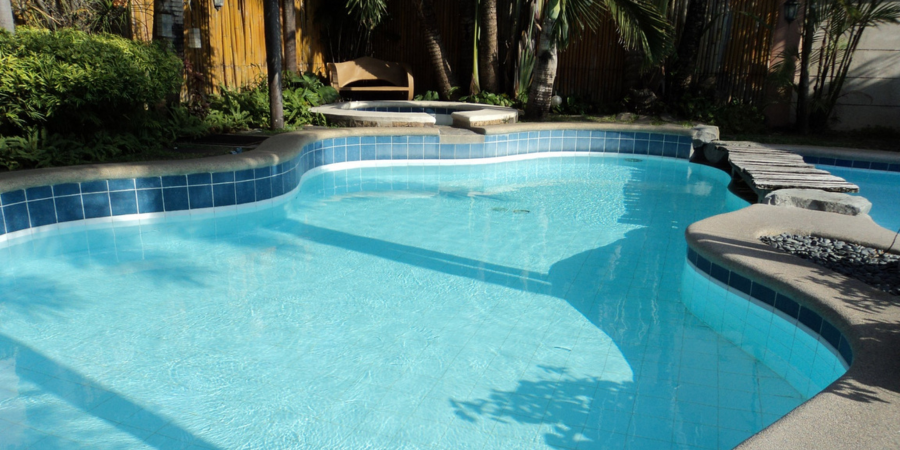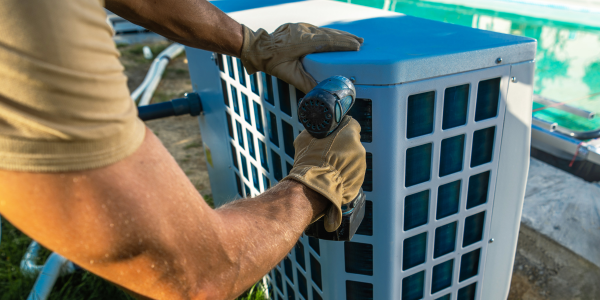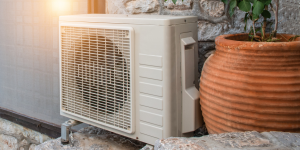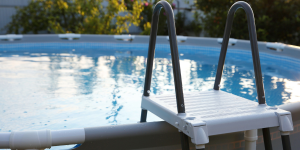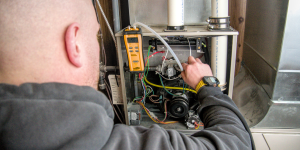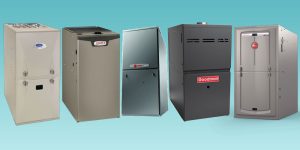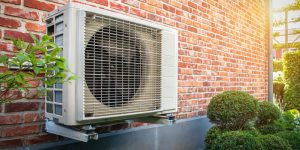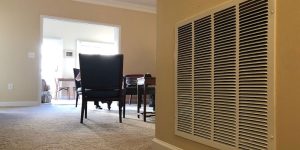Heating your pool in Canada isn’t just about comfort—it’s about extending your swim season, protecting your investment, and making your backyard space more usable throughout spring and fall. With our short summers and fluctuating weather, choosing the right pool heater can mean the difference between a chilly dip and a relaxing soak.
As a technician who installs and services pool heaters every summer, I’ve helped hundreds of homeowners compare options. Below, I break down six of the most effective ways to heat a pool in Canada—highlighting how they work, when they make sense, and what you can expect in terms of performance and cost.
- Propane Pool Heater
- Electric Pool Heater
- Solar Pool Heater
- Wood Burning Pool Heater
- Natural Gas Pool Heater
- Heat Pump
**Note: Please note that these figures are approximate and can vary based on factors such as local utility rates, pool size, climate, and usage patterns. For the most accurate information, consult with local pool professionals or utility providers familiar with your area’s pricing and conditions.
1. Propane Pool Heater
A propane pool heater burns liquid propane in a combustion chamber to heat water as it passes through the system. This type of heater is known for its fast, powerful heating, which makes it ideal for pool owners who want to raise temperatures quickly—especially at cottages or in rural areas where natural gas isn’t available. Propane systems work independently of electricity and can maintain performance in any weather.
According to Pool Products Canada, monthly propane heating costs typically range from $200–$400, depending on pool size and usage. You’ll also need space for a propane tank and regular deliveries throughout the season.
- Best for: Rural homes or cottages needing quick, on-demand heating.
- Pros: Heats water quickly and reliably in all weather.
- Cons: High fuel costs make it less practical for daily use.
2. Electric Pool Heater
An electric pool heater uses resistance coils powered by electricity to heat pool water as it circulates through the unit. It’s a simple, low-maintenance option that doesn’t require gas lines or propane tanks, making it popular for small pools, spas, or homes without gas service. These heaters are quiet, compact, and work in any weather—but they tend to heat water more slowly than gas or propane systems.
The biggest drawback is cost. Pool Products Canada estimates that monthly electric heating costs can range from $100–$600, depending on usage and electricity rates in your province.
- Best for: Small pools or spas in homes without access to gas.
- Pros: Easy to install and works in any weather.
- Cons: Slower to heat and expensive to run in high-use scenarios.
3. Solar Pool Heater
A solar pool heater uses panels—usually mounted on your roof or nearby structure—to absorb energy from the sun and transfer it to your pool water. As water circulates through the system, it’s warmed by solar energy before returning to the pool. This method has almost no operating cost and can extend your swim season by several weeks, making it one of the most eco-friendly ways to heat a pool. It works best in regions with plenty of sun and requires a south-facing roof or open area to install the panels. However, it’s slower to heat and may not provide consistent performance in cloudy or cooler weather without a backup system.
According to Pool Supplies Canada, solar heaters have virtually no ongoing costs, with minimal power needed to run the circulation pump.
- Best for: Homeowners in sunny regions aiming for low-cost, eco-conscious heating.
- Pros: Nearly free to operate and environmentally friendly.
- Cons: Slower to heat and inconsistent performance in poor weather.
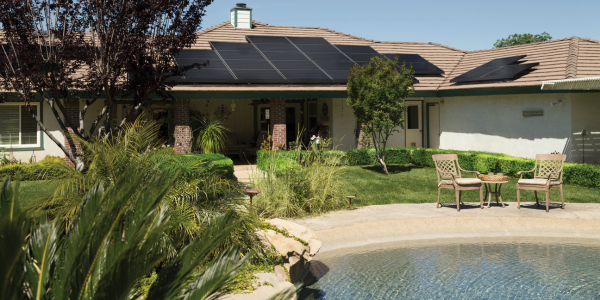
4. Wood Burning Pool Heater
A wood burning pool heater works by burning firewood in a dedicated firebox or chamber that transfers heat to a water coil or exchanger. This method is often used at off-grid cottages or cabins, especially where electricity and gas access are limited or nonexistent.
It’s a cost-effective option if you have access to free or cheap firewood, but it’s also the most labour-intensive system on this list. You’ll need to manually build fires, monitor temperatures, and ensure the setup is vented and safe—making it less convenient for daily use. While exact costs vary, the system is generally inexpensive to operate, assuming firewood is readily available.
- Best for: Off-grid properties or cottages where fuel is readily available.
- Pros: Inexpensive to operate if you have access to wood.
- Cons: Manual operation and lack of precise temperature control make it less convenient.
5. Natural Gas Pool Heater
A natural gas pool heater operates similarly to a propane system, using a gas burner to quickly heat water as it flows through the unit. This is one of the most popular options in urban and suburban areas, especially for homes already connected to a natural gas line. Natural gas heaters provide powerful, fast heating and are effective regardless of outdoor temperature or sunlight.
Based on Canadian data from Pool Products Canada, monthly heating costs with natural gas generally fall between $200–$400, depending on usage.
- Best for: Homeowners with natural gas service who want fast, weather-independent heating.
- Pros: Quick heating and consistent performance in any climate.
- Cons: Ongoing fuel costs can be high for regular use.
6. Swimming Pool Heat Pump
A swimming pool heat pump draws in ambient air, extracts the heat from it, and transfers that heat to your pool water via a compressor and heat exchanger. It’s one of the most energy-efficient ways to heat a pool, delivering 3–5 units of heat for every unit of electricity used. Heat pumps are best suited for late spring through early fall in Canada, as they rely on air temperatures staying above 10°C to operate efficiently
Pool Products Canada reports that running costs are often under $1 per hour, making heat pumps one of the most cost-effective options for regular use.
- Best for: Energy-conscious pool owners using their pool regularly in spring/summer.
- Pros: Extremely efficient and cost-effective to run.
- Cons: Slower heating and limited performance in colder weather.
Pool Heater Comparison Table
Here’s a side-by-side comparison of the most common ways to heat a pool in Canada:
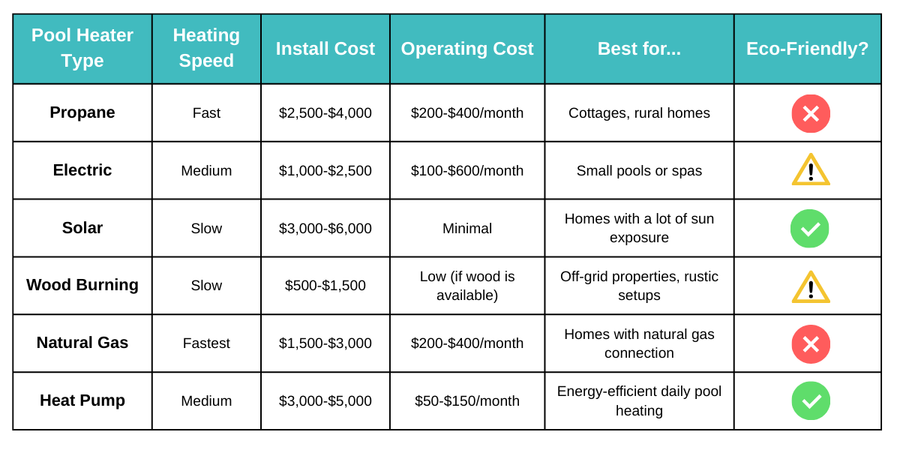
Tips to Maximize Pool Heat Retention
No matter what type of heating system you use, preventing heat loss is just as important as generating it. Here are a few simple ways to hold onto that warm water longer:
- Use a solar pool cover: This can reduce heat loss by up to 70% overnight and significantly cut down on evaporation.
- Install a windbreak: Fences, hedges, or privacy walls help reduce convective heat loss caused by wind.
- Maintain your water level: Pools that are overfilled or underfilled can interfere with circulation and heating efficiency.
- Set your timer smartly: Run heaters during the warmest parts of the day to improve efficiency, especially for heat pumps or solar systems.
How to Choose the Right Pool Heater in Canada
When helping customers decide on the best way to heat a pool, I usually walk them through a few key questions:
Do you swim daily or just on weekends?
If you’re a daily swimmer, a heat pump or natural gas system may offer the best long-term value. For occasional use, propane or wood-burning could make more sense.
Are you connected to natural gas or off-grid?
Access to fuel sources plays a big role. Urban homeowners with natural gas access often choose gas heaters, while rural or off-grid properties go with propane, wood, or solar.
What’s your budget for installation and monthly bills?
Some systems, like solar and heat pumps, cost more upfront but save money over time. Others, like propane, are cheaper to install but more expensive to run regularly.
What kind of weather and sun exposure do you get?
Solar works best with a south-facing roof and steady sunshine. Heat pumps thrive in moderate temperatures but slow down when it’s colder than 10°C.
A quick conversation with your local HVAC or pool technician can help narrow the list based on your setup and goals.
Final Thoughts from a Pool Heating Expert
There’s no single “best” way to heat a pool in Canada—but there is a best choice for you.
If you want low-cost, eco-friendly operation, a solar heater or heat pump might be the way to go. If you prioritize speed and simplicity, natural gas or propane offers the fastest results. And for off-grid properties, a wood-burning system can be both practical and affordable—if you don’t mind tending the fire.
As an HVAC technician who installs these systems every summer, I always tell homeowners: think beyond the install cost. Consider how often you swim, how long you want your season to be, and what your long-term energy usage will look like.
If you’re unsure where to start, we’d be happy to help you weigh your options. Our team specializes in pool heater installations tailored to Canadian conditions—and we’ll make sure you get a solution that fits your needs, your home, and your budget.
👉 Ready to heat your pool the smart way? Contact us today for a recommendation or installation quote.
